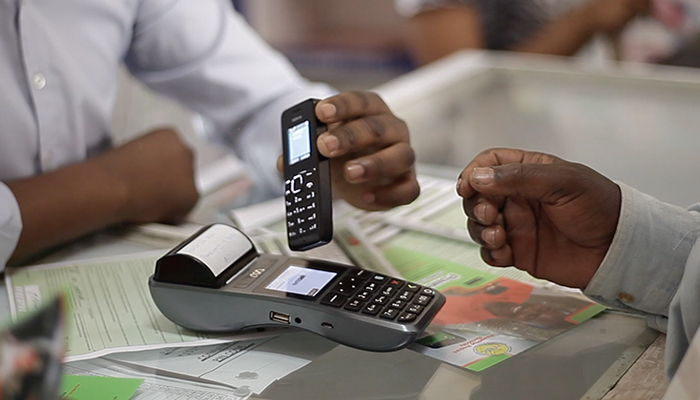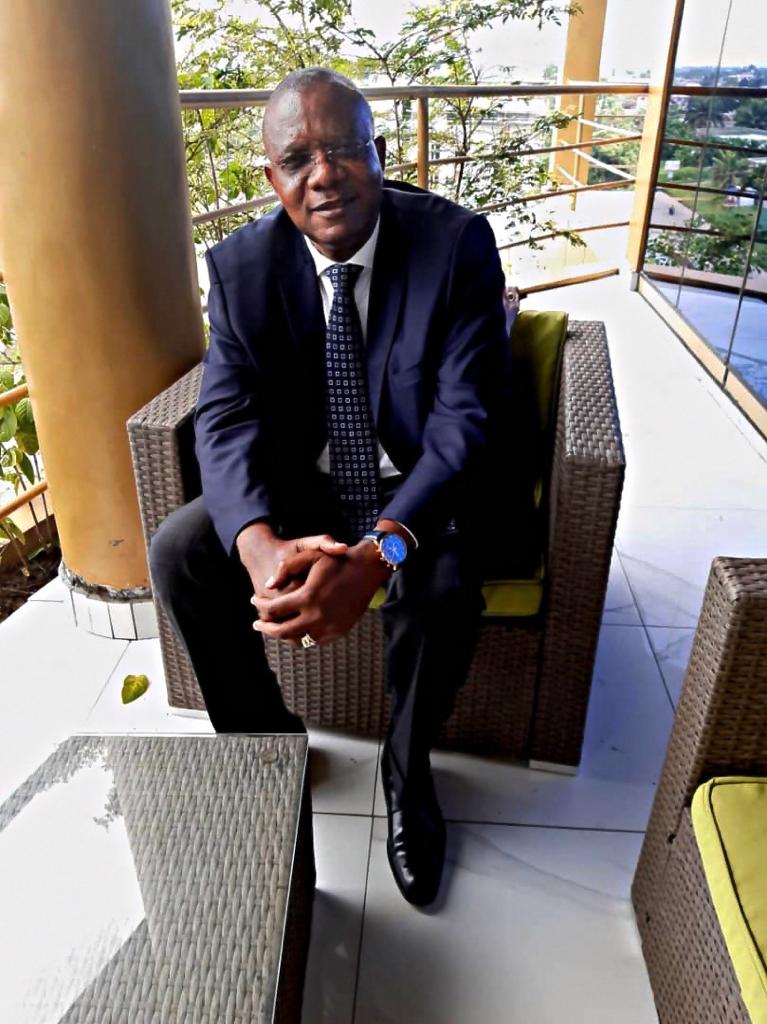It is extremely difficult to talk about the successes of Commercial Bank Cameroon (CBC) without mentioning its managers. Mr. Clément Kemayou is one of them, a true reflection of a fine professional in banking and finance whose dedication and commitment to success have no borders. Wherever he has gone, the current CBC Regional Director for the Littoral and South West has left over the years indelible marks of professionalism and humility, placing himself as one of the best bankers.

After his academic training, the native of Kékem and native of the village Baloumgou in the West Cameroon Region, began his incredible professional career in 1982 at SGBC in Nkongsamba as a simple agent, then his meteoric rise in rank due to his manipulation with ease of accounting, banking and computer tools allowed him to automate the repayment of loans, something that previously was done manually by means of promissory notes. Only the Headquarters and the agencies located in the city of Douala knew at the time the happiness of automated loan processing. With this IT breakthrough, this young potential executive was quickly recalled to General Management in 1987, a first in the history of this bank where an agent recruited from the provinces was thus transferred to Headquarters by decision of the General Management! The goal of this change was to share experience and best practices, especially with someone who brilliantly combines banking operations and IT practice.
This multidisciplinary approach substantially lightened the basic back-up work such as monitoring suspensions in order accounts, bank reconciliations as well as liaison accounts. After the creation in the Directorate of Central Organic Services of a flying service of Accounting Assistance at the Counters, Mr. KEMAYOU has, for 2 years, provided assistance and provided training for Accountants and their Correspondents in branch. At the end of this mission, projected in 1992 to the Audit and Management Control Department, where he was alternately appointed Controller, Junior Auditor and then Principal Inspector. After 3 years of practice, he is promoted to the rank of Inspector Head of Mission, a responsibility he will hold until he leaves this Department to be oriented to the operation where he was entrusted with the destiny of the Douala Bali agency. , the third in the Societe Generale network in terms of importance after the Headquarters and the Yaoundé Agency. The feats of arms outside of operation stricto sensu was to reduce reporting from 60 to 20 days, this not having upset habits and processes, to the great happiness of the increased control of operational risks.
It should be noted that in the Internal Audit and Management Control Department, Mr. KEMAYOUClément not only carried out several missions of importance in terms of efficiency, compliance and advice. He had also greatly contributed to the design and implementation of Permanent Monitoring, the 1st level control system of Société Générale, with the key, software dedicated to the management of the whole, a personal tool. designed and developed using the VBA language by this framework, a contribution greatly appreciated by the BHFM branch, the Metropolitan Department responsible for the Africa zone at Société Générale in Paris.
Mr. Clément Kemayou has in turn been a member of the supervision team for the migration of the bank’s IT system which went through “BIG BANG” from IBM RISC6000 to the DELTA BANK software package, an operation carried out successfully after several months of intense work. He was also a member of the “Info 2000” team with General Management, a dedicated team responsible for reflecting and developing action plans for the transition to the year 2000.

The longest professional stay in this framework began precisely in 2000 when he left Société Générale to join the Commercial Bank group where, on the strength of his experience, he was transferred to Chad as soon as he was recruited, to ensure the Internal Audit Department of this subsidiary, A direction that he created from scratch and spent 11 years of service there. Apart from the organization and implementation of the bank’s Internal Control system, he will, among other things, design and implement IT tools not only for the management of Human Resources, the commissary but also the management of an Audit Department in particular and the internal control system in general (The audit management software made it possible to automate the generation of Problem Analysis Disclosure Sheets (FRAP), detailed mission reports, follow-up recommendations formulated by both Internal and External Audit missions, the preparation of the annual programming of Internal Audit missions, the generation of working papers, in other words files used for carrying out the missions, etc.). During 11 years as Director of Internal Audit, the banker and financial expert, always committed and assiduous, will have, among other things, had the Board of Directors adopt the very first charter not only of Internal Audit, but also that of Governance within the Deliberating Body.
At the end of this long stay in Chad, he will return in 2011 to his native Cameroon where after a brief stint of one year at the Human Resources Department of the CBC, where he will computerize the management of personnel files, he will be transferred. as Deputy Director in charge of SMEs / SMIs, Institutionals and Micro Finance Establishments, a position he will occupy for a year before being brought to the supervision of the Littoral and South-West Regions as Director.

Mr. Kemayou made a significant contribution to the success of the CBC in his own way, despite a difficult passage from the bank through the Provisional Administration for 7 years.
The bank, since the restoration of its financial balance in 2016, has achieved positive results, therefore 1,551 million in 2017; 2.130 million in 2018 and 2.521million in 2019. Today, it is committed to increasing its current share capital over the following months from XAF 12 billion to XAF 16.5 billion, a revelation of the bank’s success with the very marked and appreciated support of the State of Cameroon.
CEMAC EFO FINANCE sat with the experienced banker for this interview.
You are Regional Director of the CBC in charge of the Littoral and South-West Regions. What can you say about your Regions?
As an institution, the Littoral and South-West Regions of its acronym DRLSO is globally 6 main banking agencies including Bonanjo, Akwa-Mbopi, Akwa-Center (instead of the porticos), Bonabéri, Makepe, Kribi and two points of sale, therefore the Deido counter and the Grand Mall (currently opening). It is about sixty employees and in terms of operations, it is more than 16,000 accounts cumulating XAF 78 billion in deposits and XAF 27 billion in uses, commonly called credit, for an operating ratio of 289%
You understand that managing such a machine is no easy task. Fortunately, I have fantastic collaborators, all dedicated to the task where everyone knows exactly what to do. By analogy to a musical orchestra, each staff member knows which score to play to allow the conductor that I am, to put the whole to music, for the great good of our customers and of the General Management who can be seen thus accompanied in a very good way in its quest to achieve its objectives and this, in compliance with laws and regulations.

What are the challenges you face and need to overcome at the moment?
You know, we live in a troubled environment in many ways. A few years ago, the world economy was characterized by the sharp fall in the prices of raw materials, the main source of foreign currency income for many countries, especially those in the process of development, including ourselves Cameroon. This already very difficult situation was added to several other crises, in particular on the security level with several sources of tension including the maritime pirate in the Gulf of Guinea, the rebel incursions in the East of the Country, the kidnapping of citizens in the Region. of Adamaoua, the war against BOKO HARAM in the Northern and Far North Regions and finally the war in what we trivially call the NOSO. You understand that all these hotbeds of tension are hardly conducive to business in more than one respect. First, they bleed dry the treasury of the state, which is a major player in economic life. Then there are economic operators, among whom the banks cannot work in an environment dominated by insecurity. The other challenge that characterizes the global news of the hour is the health crisis of COVID-19 which not only caused numerous losses in human life and led to the closure of the borders of almost all countries, imposing on the world whole a kind of life in autarky for considerable periods. I will skip you details about the many other consequences of this global scourge, the effects of which have not yet been evaluated.
You left SGBC for CBC. What drew you to the CBC?
Société Générale, formerly of Banks in Cameroon, is a very large banking institution in the country belonging to the global group of Société Générale where I had the privilege and honor of going through its school when I started. I was recruited there on December 9, 1982 and spent 17 years of professional life there. I acquired a solid background in banking, which I am proud of and infinitely grateful to this institution. It turns out, however, that towards the end of 2000, I thought it was time for me to explore other horizons, wishing to join a bank that was just as young as I was at the time, in order to that we walk together. I therefore had the choice of joining AFRILAND FIRST BANK or the COMMERCIAL BANK-CAMEROUN, two local banks which had big ambitions of development and conquest of market share. However, for two years in a row I had on my heels a headhunter who never ceased to offer me integration into the Central African subsidiary of CBC, something that I had always declined until ‘one morning in July 2000, while I was on sabbatical leave, he offered me the proposal to join the CBC in Cameroon because the Director of the Bonanjo Agency had just resigned. Thus, having given him my file, I was very quickly invited to the job interview during which the members of the jury therefore the Inspector General of the Group was very interested in my career as an auditor while in the At the same time, the Managing Director of the bank was for his part interested in my progress in operations, in particular my passage through the management of the SGBC agency in Douala-Bali, the third agency of the network in terms of importance, let’s recall. the. At the end of this interview, behind-the-scenes negotiations began, the Inspector General offering me an expatriation position with more advantages than I would have aspired to by taking the head of the Douala-Bonanjo Agency. This is how I had to find myself in the Commercial Bank Group where I was sent to Chad to set up Internal Audit there and thus respond to an injunction formulated by COBAC vis-à-vis this subsidiary without an internal control system in line with its requirements in this area.

Your bank, the CBC, achieved a gain of CFAF 2.5 billion in 2019, and plans to increase the capital from CFAF 12 to 16 billion. What explains this success?
You know that upon leaving the provisional administration in 2016, the bank acquired new managers who quickly understood the workload and the many challenges they faced. Knowing that human capital is the backbone of any business success, General Management, under the leadership of the Board of Directors, joined forces with all the staff to initiate vast and profound reforms in order to secure the bank. to a sector in full revolution, dominated by ever increasing competition. Following the adoption of its recently renewed three-year strategic plan, the bank embarked on a vast transformation program:
Our branch network has been enriched with three points of sale, including that of NGONG in Garoua, MAKEPE in Douala and then in KRIBI, thus affirming the proximity policy which was now part of the bank’s policy.
Large investments have also been made, among other things to rehabilitate the IT platform and start the digital transformation of the bank.
Not to be long, I will simply say that this whole set has not only enabled the bank to better meet customer expectations, but also to improve its financial performance while controlling risks.
The figures you mention are the result of all these efforts made by the General Management in concert with all the staff.

To what extent has the interim administration and restructuring been helpful to the success of the CBC?
A bank is placed under provisional administration when the banking supervisory body, COBAC, observes glaring inadequacies, or even abuses in operations, which could jeopardize the continuation of the activity. This is a safeguard measure otherwise qualified as provisional and conservatory, the time to allow a temporary administrator appointed first to make an inventory and submit for validation of his mandate the COBAC, a credible recovery plan. Once this plan has been validated, the latter has the duty, within a defined period of time, to have the said restructuring plan implemented.
The provisional administration of the CBC took a particularly long time (7 years), at the end of which the major financial balances of the bank were restored. This has hardly resulted in a social plan, but it has had the merit of making each staff member aware of the importance of their working tool, which is the bank. The employees worked very hard, sometimes in inhumane conditions, not only to preserve this precious work tool but also to ensure that it was not too severely affected by the interim administration through the massive loss of clients.
You know, the sage said, “Success makes you arrogant while failure is formative” and I will add, especially for those who know how to learn from their failure. We have learned a lot from the failures that brought the bank under interim administration.
You spent 11 years in Chad, what experiences have you drawn there?
I went on expatriation to Chad 2000 and returned home in 2011 when, when I got there, I was not sure if I would make the end of the month. I met some nice staff there with legendary hospitality. It was an exhilarating experience both personally and professionally. Confronting and living in perfect harmony with people of totally different cultures and customs is always something very exhilarating and rewarding.
On a professional level, create from scratch an Internal Audit Department in a company where the control culture was poorly developed, draft and enforce most of the procedures, especially those of the bank’s front office, design, have them approved by the executive, validate by the deliberative body and implement a 1st level control system, establish a certain corporate culture in an environment where habits were formerly dominated by the behavior of civil servants and public officials, in other words Changing habits long rooted in death has never been an easy task! These are all challenges I had to face during my stay in Chad, something that I think I did brilliantly, judging by the feedback I have had from colleagues and acquaintances. Do you know that with the exception of Société Générale in Chad, almost all of the Audit Directors of local banks were my former employees to whom I provided training, instilled work values and professional rigor? One of them was even the Advisor to one of the Prime Ministers of Chad.
In the end, I think it was in Chad that I spent the best part of my professional career, the stay was so rich in lessons and sharing.

Many banks have been affected by the COVID-19 pandemic, what is the situation at the CBC?
I do not know if there is a bank, to stay in the banking business, that has been immune to the effects of COVID-19 with the understanding that we operate in a globalized environment where we are interdependent.
In the specific case of the CBC, our customers and partners have suffered from the effects of this pandemic in various ways, but we have internally and in accordance with the regulations of the regulator, taken a number of accompanying measures compatible with the degree of each individual’s difficulties. Credit repayment has been suspended for customers who were having difficulty dealing with it due to the drying up of income related to the confinement. Other commitments, in particular with regard to heavily affected sectors such as hotels, air transport, internationally oriented activities, have been restructured. The closing hours of the counters underwent slight rearrangements to take into account the fact that our own human resources, scarce available due to confinement (only 30% of the workforce was operational) were not in sufficient number to allow sufficient agility. facing the processing of customer transactions. There followed, long queues with the obligation to serve everyone before the counters closed.
As part of the barrier measures, areas protected against bad weather have been set up in front of our branches to allow customers to wait for their turn of duty in better conditions, since the counters could only accommodate a limited number of people to comply with physical distancing. Obviously, hydro alcoholic gels, thermoflash, are permanently available for both staff and customers. Disinfection gates have been installed at the entrance to some of our branches.
Relations between the CBC and the State of Cameroon have been well. How has the state contributed to the success of the CBC?
As I said above, the state is a major player in the national economic scene. In the light of the various crises which have followed one another all over the world in recent years, this role has been increasingly asserted, as you must have certainly followed in the international media.
As for the CBC, you know that it was the state that bailed out the coffers, thus preventing the bank from certain liquidation during the Provisional Administration. This tragic hypothesis would have put almost 300 people out of work, without counting the other induced effects.
In what ways can the government help Cameroonian banks to be more competitive during this COVID-19 pandemic?
COVID-19 has negatively impacted economic life, in which banks are one of the players. We have seen ambitious state interventions in a different light, ranging from direct cash aid to companies to the provision of lines of guarantee allowing SMEs to get into debt with banks. Many other actions were also in favor of households which we will not come back to. With regard more specifically to actions in favor of banks, the monetary authorities have eased certain prudential ratios in order to allow banks to respond more effectively to the financial needs experienced by economic operators.
It should also be noted that the Institute of Issue the BEAC carried out on June 4, an injection of liquidity to the money market of the order of 250 billion, this after a previous operation of the kind where on May 19 it involved a first injection of XAF 240 billion to 500 billion. These are the means made available to primary banks like us so that we can intervene more easily to support the efforts of economic operators in the face of COVID-19. In the same vein, several other measures have also been adopted at the sub-regional level, including the decrease by the BEAC of 25 basis points in the call for tenders rate, the downward revision of 100 basis points in the marginal lending facility to name but a few, very sophisticated techniques that allow banks to borrow more cheaply on behalf of their clients.
You have understood that the measures cited are those taken either by the COBAC or the BEAC given the specificity of the banks whose activity is particularly regulated by these supra-national supervisory bodies.






